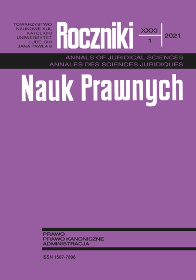The Competence of the Conference of Bishops to Define Acts of Extraordinary Administration
Abstract
The article explores the legal requirement for defining the acts of extraordinary administration by the conference of bishops (can. 1277 in fine). In Poland, the Episcopal Conference has not yet defined these acts of administration. The analysis of the particular law of other conferences lays down three criteria for establishing acts of extraordinary administration. The requirement of canon law stipulates that those acts cannot be determined on the basis of the instructions, but the decree (can. 455). For the decree to enter into force it is to obtain recognition from the Congregation for the Clergy. Therefore, the above-mentioned acts are important not only to distinguish these acts from transactions which can worsen the patrimonial condition of a juridical person (can. 1295), but also for collective bodies who are to give the consent to place these acts (can. 1277).
References
Aznar Gil Federico R.: Actos de administración ordinaria y extraordinaria. Normas canónicas, „Revista Española de Derecho Canónico” 2000, nr 57, s. 41-70.
Combalía Zoila: The Administration of Goods, [w:] Exegetical Commentary on the Code of Canon Law, red. Ángel Marzoa, Jorge Miras, Rafael Rodríguez-Ocaña, t. IV/1, Montreal–Chicago: Wilson & Lafleur 2004, s. 81-123.
De Paolis Velasio: I beni temporali della Chiesa, Bologna: EDB Editore 2011.
De Paolis Velasio: Los bienes temporales de la Iglesia, Madrid: Biblioteca de Autores Cristianos 2012.
Domaszk Arkadiusz: Dobra doczesne Kościoła, Warszawa: Wydawnictwo UKSW 2016.
Dubiel Stanisław: Akty nadzwyczajnego zarządzania w Kodeksie Prawa Kanonicznego z 1983 r., „Roczniki Nauk Prawnych” 25 (2015), nr 4, s. 113-131.
Dubiel Stanisław: Uprawnienia majątkowe Kościoła Katolickiego w Polsce w świetle Kodeksu Prawa Kanonicznego z 1983 r., Konkordatu z 1993 r. i ustaw synodalnych, Lublin: Wydawnictwo KUL 2007.
Kaleta Paweł: Kościelne prawo majątkowe, Lublin: Towarzystwo Naukowe KUL 2012.
Kaleta Paweł: Prawne aspekty zarządzania dobrami kościelnymi, Lublin: Wydawnictwo KUL 2017.
López Alarcón Mariano: The Temporal Goods of the Church, [w:] Code of Canon Law Annotated, red. Ernest Caparros, Michel Thériault, Jean Thorn, Montreal–Chicago: Wilson & Lafleur 2004, s. 963-1016.
Morrisey Francis G.: Ordinary and Extraordinary Administration. Canon 1277, „The Jurist” 48 (1988), nr 2, s. 709-726.
Power Jeane: Corporate and Canonical Go ate and Canonical Governance:Understanding Church Property, “The University of Notre Dame Australia Law Review” 21 (2019), nr 2, s. 1-25.
Renken John A.: Acts of extraordinary administration of ecclesiastical goods in book V of the CIC, „Studia Canonica” 49 (2015), s. 577-596.
Renken John A.: Canon 1277 and 1281. Acts of Extraordinary Administration, [w:] Roman Replies & CLSA Advisory Opinions 2010, red. Sharon A. Euart [i in.], Washington: R.R Bowker 2010, s. 162-168.
Renken John A.: Threatening Contracts. The Discipline and Application of Canon 1295, „Studia Canonica” 45 (2011), s. 501-519.
Świto Lucjan: Akty zarządu dobrami kościelnymi, „Prawo Kanoniczne” 58 (2015), nr 3, s. 105-116.
Walkowiak David J.: Ordinary and Extraordinary Administration, [w:] Church Finance Handbook, red. Kevin E. McKenna, Lawrence A. DiNardo, Joseph W. Pokusa, Washington: Canon Law Society of America 1999, s. 185-206.
Zambon Adolfo: I beni ecclesiastici. Amministrazione e vigilanza, „Quaderni di Diritto Ecclesiale” 28 (2015), s. 202-229.
Copyright (c) 2021 Roczniki Nauk Prawnych

This work is licensed under a Creative Commons Attribution-NonCommercial-NoDerivatives 4.0 International License.


